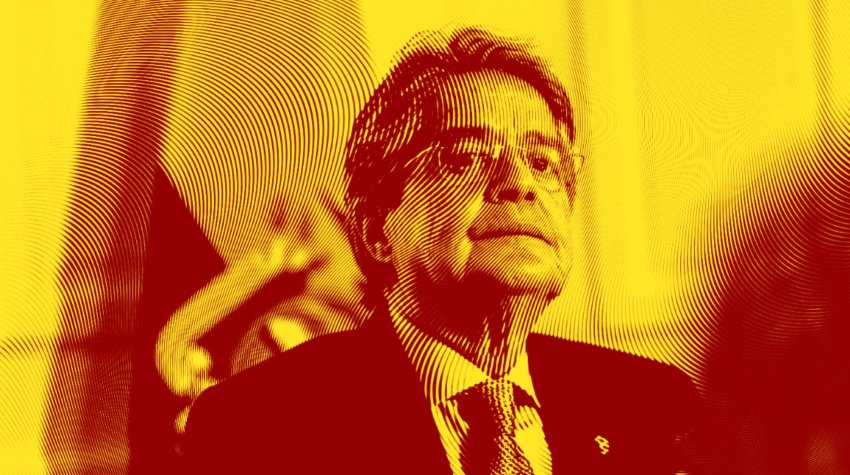
Ecuadorian right-wing president Guillermo Lasso dissolved the country’s parliament on May 17 and will rule by decree for up to six months until new elections are held. Lasso invoked a clause in the country’s constitution, referred to as the muerte cruzada (mutual death), which allows the president to dissolve parliament, and triggers presidential and parliamentary elections.
While the constitutional measure exists supposedly for use in political crises, it has never been used until now. Lasso claimed that dissolving parliament would solve the “political crisis and internal commotion that Ecuador is enduring”, but it was actually a last-ditch attempt to avoid his impending impeachment for corruption and embezzlement.
The corruption allegation centres around Lasso’s brother-in-law Danilo Carrera, and involves contracts between state-owned oil transport company FLOPEC and private company Amazonas Tanker Pool. Parliament commenced impeachment proceedings against Lasso on May 16, which were widely predicted to succeed.
Lasso’s move was backed by the heads of the army and police, who support the decision and promise to repress any protests. Police and soldiers blocked legislators from entering parliament on the morning of Lasso’s announcement.
Lasso — a rich banker who narrowly won the 2021 elections — has continued the neoliberal policies of his predecessor Lenín Moreno, resulting in rising living costs and inflation.
He faced huge Indigenous-led demonstrations last year that demanded measures to address living costs, increased funding to health and education sectors, a ban on mining and oil exploitation in Indigenous territories and respect for the collective rights of Indigenous people.
Unpopular
While Lasso’s government remains deeply unpopular with the majority of Ecuadorians — Lasso had an approval rating of 14% last month, and 81% of people polled supported his removal — the United States government was quick to support his failing neoliberal regime.
Following Lasso’s move to dissolve parliament, US ambassador Michael Fitzpatrick said that the US government “respects the internal and constitutional processes of Ecuador” and “will continue working with the constitutional government, civil society, the private sector, and the Ecuadorean people”.
US state department spokesperson Vedant Patel said that its relationship with the Lasso government “remains strong”.
The US government has been an unwavering supporter of Lasso’s neoliberal policies that have waged war against the Ecuadorian working class, along with the brutal police and military force unleashed to repress protests against these policies. US state secretary Antony Blinken vocally supported the Lasso regime’s police and military repression of mass protests in 2021 and last year.
Compare this with the US government’s response to former Peruvian President Pedro Castillo’s unsuccessful attempt to close Congress in December to avoid a right-wing coup. US ambassador Lisa Kenna — a former CIA agent with a long history of meddling in foreign affairs on behalf of the US — played a behind-the-scenes role in Castillo’s downfall, while publicly denouncing his actions.
The US state department denounced Castillo, said his actions were an attempt to “undermine democratic order” and welcomed the incoming Dina Boluarte coup regime.
The US corporate media’s response to Castillo’s ousting, compared to Lasso’s actions, laid bare the hypocrisy.
“Peru’s democracy proves resilient against a president’s coup,” was the The Washington Post’s editorial headline on December 8.
“Peru’s failed coup sparks democratic crisis”, said Foreign Policy following Castillo’s ousting.
This helped legitimise the Boluarte coup government, despite the Peruvian working class’ widespread uprising.
In their more recent headlines on Ecuador, WP went with “Ecuadoran President Guillermo Lasso dissolves Congress, avoiding impeachment”, while Foreign Policy’s headline read “Lasso’s last resort”. Not one outlet referred to Lasso’s move as a “coup”, and instead went to work legitimising his government.
Corporate-owned media outlets in Latin America, such as Clarín and La Nación, mirrored the hypocritical reporting.
Response
The Confederation of Indigenous Nationalities of Ecuador (CONAIE) — Ecuador’s biggest Indigenous rights organisation that led huge mobilisations against the government last year — quickly condemned Lasso’s move in a statement and called for grassroots assemblies across the country. CONAIE president Leonidas Iza denounced the “interference of the US embassy … aligned with neoliberal policies against the Ecuador’s sovereignty”.
Former Bolivian President Evo Morales condemned Lasso’s move and highlighted the hypocrisy of his actions. “To avoid a corruption trial, Lasso has closed Ecuador’s Congress with the excuse of ‘internal commotion’,” Morales said.
“Five months ago, he accused [Pedro Castillo] of being a coup-plotter for doing the same.”
Morales called this the “double standards of the right wing”.
Iza warned that Ecuadorians must be vigilant and prepared to mobilise against laws that Lasso tries to approve by decree.
Using his decree powers, Lasso has already tried to ram through neoliberal anti-worker laws, which would involve tax cuts for big corporations, further privatisation of state-owned assets and the rollback of labour protections.
Lasso’s finance minister Pablo Arosemena revealed plans for further, predictably neoliberal, reforms before the end of his tenure. “We hope to do in six months what was planned in two years,” he said.
General elections are scheduled for August 20. Lasso has said he will not run.